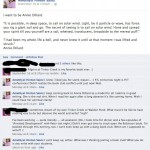I used to believe that teaching was my identity. I saw it as a vocation in the oldest sense – vocare, a calling. I spent my free time grading, lesson planning and reading up on journal articles. I felt inspired by Stand and Deliver and I wondered if I could look as cool as Michelle Pfeiffer inspiring the various dangerous minds that I knew.
I lived to teach. I blogged about education for fun. I hung out with fellow teachers and only talked shop. I spent the first year of my oldest son's life getting home at seven at night and reading teacher books while he fell asleep on my shoulder. I missed so much. I was hoping that my students who learn to live well, but I was missing life.
Things changed. It was fairly gradual. However, over the next few years, I began to see my own kids as the children who mattered most to me. I saw the need to write and draw and watch some t.v. without thinking about lesson plans. I still wept over broken lives, but I realized that I couldn't play Superman (which is a good thing, because I don't look good in tights).
I went from living for teaching to teaching for a living. I now realize that teaching is a part of who I am, but it is not my full identity. It is a profession. It is meaningful and challenge and often filled with joy. However, it is also a job. It's not the sum total of my life's mission.
So, it has me thinking about policy. I wonder how often the sense of "teaching as an identity" and the myth of the super-teacher pushes an unhealthy view of the loyal, selfless teacher-martyr. I wonder how often we fail to stand up to pay cuts or a lack of supply money, because it goes against the narrative of the quiet, selfless teacher. I wonder if we allow bad policies to exist because of a very noble (though often misguided) belief that we are doing something that isn't a job.
When I saw teaching as my full identity, I was unable to ask for help. To do so meant I had failed as a person. I didn't advocate for teachers. To do so meant I was being whiny and failing to be a martyr. I didn't take a break. To do so meant I was lazy.
Now that I see teaching as a profession, I am more vocal about things like health care costs or teacher salary. I speak out as a professional against bad practices. Realizing that I can't be Superman, I am more likely now to work toward changing unjust systems so that kids can learn in a more meaningful way.








